Figure 4.
Evidence suggesting gut-lung translocation of bacteria in humans with the acute respiratory distress syndrome (ARDS). A Bacteroides sp. (OTU009), a representative of most abundant bacterial genus in the human gut microbiome, was absent from reagent control specimens and the lungs of healthy subjects, but common (33% of specimens) in the lungs of patients with ARDS (a). The relative abundance of this Bacteroides sp. was positively correlated with serum TNF-α but not associated with alveolar TNF-α (b). By contrast, alveolar TNF-α was positively correlated with relative abundance of the Proteobacteria phylum and negatively correlated with the Bacteroidetes phylum (c). 100 bronchoalveolar lavage specimens from 68 unique patients were studied. Statistical significance was determined by linear regression using logarithmically-transformed cytokine data (b, c).

